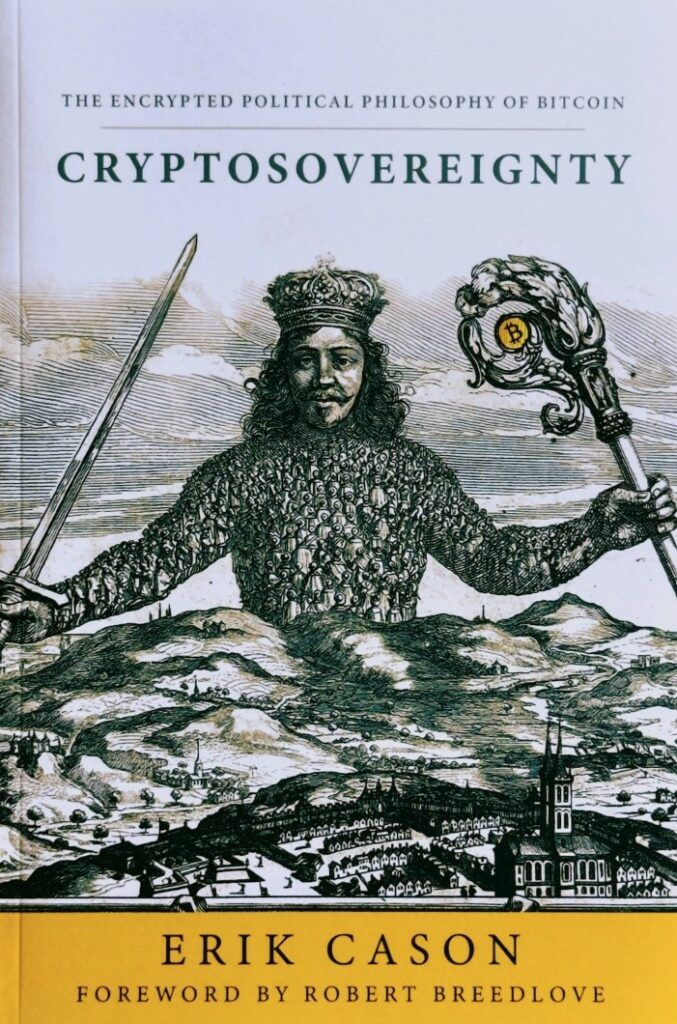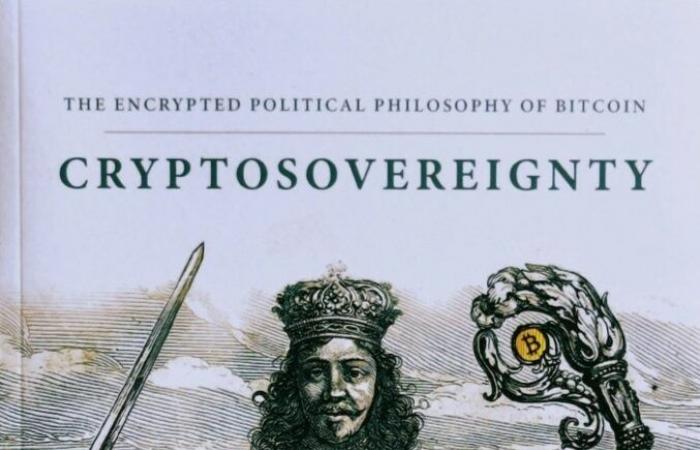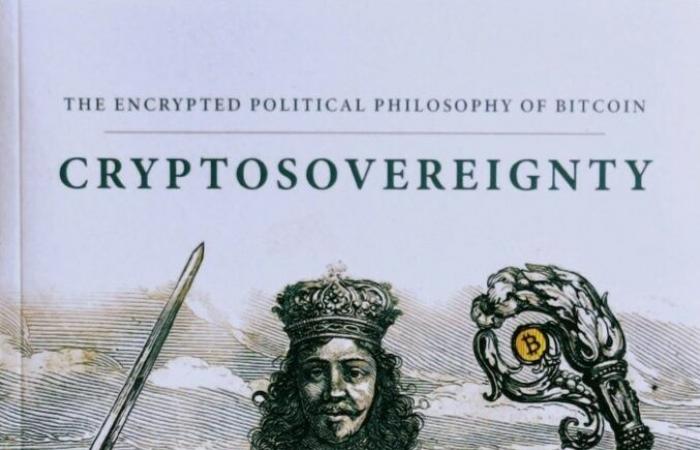Key facts:
-
The sovereignty of the State is not reason or truth but authority, power.
-
Cryptosovereign is the book that best conveys the crypto-anarchist political philosophy of Bitcoin.
This article was written by Leopoldo Bebchuk, an anthropologist from the University of Buenos Aires, who is dedicated to research on Bitcoin and cryptocurrencies from the social sciences. He currently works at MicroStrategy Latin America as a Bitcoin expert in addition to his technical role with the company’s software.
“Cryptosovereignty: The Encrypted Political Philosophy of Bitcoin” is the literal translation of the title and subtitle of this book. The book is the one that best conveys the crypto-anarchist political philosophy of Bitcoin, while expressing the feeling of the sublime that one experiences when understanding the why of Bitcoin.
Editorial data
Erik Cason: Cryptosovereignty: The Encrypted Political Philosophy of Bitcoin (digital and printed). Nashville: Bitcoin Magazine Books; 2023. ISBN 979-8-9857289-7-2, 979-8-9857289-8-9. Only English edition
It can be purchased on Amazon and on the Bitcoin Magazine site. Bitcoin Magazine only sells the print edition, for USD 29.00. Amazon sells both the print edition, at the same price, and the Kindle e-book edition at USD 16.99.
Table of Contents
Front page
The cover is the upper half of the frontispiece to Thomas Hobbes’ Leviathan, made by Abraham Bosse, with slight modifications: the pastoral staff in his left hand contains the Bitcoin logo and the phrase above, Non est potestas super terram quae comparetur ei (there is no power on earth that compares to it) has been removed.
Structure
- Part One – A Theory of Cryptography
- Chapter 1 – Crypto sovereignty
- Chapter 2 – The meaning of crypto
- The origins of the term “crypto.”
- Anarchism without adjectives
- Crypto without criticism, but with criticism
- The hiding of crypto
- The meaning of Crypto without decryption key
- Chapter 3 – Crypto, truth and power
- Chapter 4 – The new form of power hidden in crypto
- The oath of the machines
- The language of code
- Chapter 5: The sovereign, the subject and cryptopower
- Identity and submission
- Identity and fields
- The fracture of the political body
- The emergence of cryptography
- The Final Crypto Decision
- Part Two – A Theory of Bitcoin
- Chapter 6 – Messianic Bitcoin
- Chapter 7 – The Concept of the Hidden Political in Bitcoin
- Chapter 8 – Crypto-Partisan Theory
- Aspects and Concepts of the Last Stage
- Destruction of Social Order
- Global-Political Context
- The Technical-Industrial Aspect
- Chapter 9 – Bitcoin and the theological conquest of Money
- Chapter 10 – The Political Theology of Bitcoin
- Chapter 11 – The Legend of Satoshi Nakamoto
- Third part – Bitcoin in practice
- Chapter 12 – The hope of Bitcoin
- Chapter 13 – Bitcoin and the conquest of privacy
- Chapter 14 – The Bitcoin Pedagogy
- The power of understanding the truth machine
- The common health of knowledge
- The next Bitcoin Polis
- Chapter 15 – Bitcoin and the State of Exception
- Introduction to the true state of exception
- The Civil War for Freedom
- Part Four – Philosophy and Bitcoin
- Chapter 16 – The question about Bitcoin
- Who is Satoshi Nakamoto?
- Chapter 17 – A ‘pyrotechnic’ plot, or reflections on conceptual history
- Conclusion: To my crypto colleagues
Content: philosophical, political, theological, deep, repetitive
The aforementioned chapters occupy 284 pages. In them he develops ideas of political philosophy and the impact that Bitcoin has on them. It mainly takes concepts from Schmitt, Agamben, Benjamin and Foucault regarding the definition of sovereignty and the figure of homo sacer and the concept of “state of exception” (Ausnahmezustand). He has a great influence from Heidegger in the way he develops the text and takes some of the concepts from him, but they are not central. The book presents the state as Hobbes’ Leviathan, which bases its power on physical violence and a pact made by rulers, which as corruptible humans they assiduously break. In contrast, Bitcoin is presented as a revolutionary and even messianic technology that will destroy that order of things in favor of a new one (novus ordo seclorum).
Style
The vicious magnanimity and imperium with which cryptography sacralizes mathematics allows it to consecrate the glory of a singular Spinozian God [Deus sive Natura] for whom there are no exceptions within his mathematics machine, his immanent laws of the universe and his passion for a form of wealth that is beyond the power of any group of men. It is the resounding thunder of an idea whose time has come and which cannot be stopped.
Cason, Erik: Cryptosovereignty. Page 101
The previous section is a clear example of the style in which Cryptosovereignty is written. With an epic and passionate tone, esoteric at times, the book delves into meditations on the nature of sovereignty, cryptography and politics. The same bibliographical quotes and arguments are repeated over and over again in an almost obsessive way as part of this meditation, which becomes not only rational and philosophical, but also emotional and even religious. This is an intentional effect of the author, in his own words:
At times this book can seem pedantic and repetitive, going over the same quotes over and over again or making the same linguistic connections to particular works or phrases. It is an effect of Heidegger’s thinking on me.
Cason, Erik: Cryptosovereignty. Page 28
But it’s also an effect of the fact that the book is made up of different articles that Cason wrote over the years. As if tracing a spiral in the reader’s understanding, each chapter returns to the same themes and introduces something new, in a hermeneutical exercise to bring the reader closer to answering the question: Why Bitcoin?


Buy “Cryptosovereignty»
Cryptosovereignty is a thought-provoking and insightful book about bitcoin and the sovereignty of the individual against the state. This book is attractive to those who wish to have a broader perspective that introduces bitcoin into the tradition of political philosophy of humanity.
US$16.99 (Kindle Edition)
Bitcoin’s Encrypted Political Philosophy
The central proposition of the book is the following:
Thomas Hobbes in Leviathan put it this way: Auctoritas, non veritas facit legem (Authority, not truth, makes legitimacy). What this means is that the founding principle and heart of State sovereignty is not reason or truth but authority, power. While the sovereign presents himself as the orderer of a society that would otherwise be in permanent conflict, as an arbiter and protector, his fundamental principles place him against, and not in favor of, those governed by him. Although the modern State is based on laws that the state itself must respect, there is a mechanism to bypass them. This mechanism is the “state of exception”, studied by Schmitt, Agamben and Benjamin.
In a state of exception, the State assumes powers above its own laws and allows and justifies the transgression of the rights of its citizens, by turning them into “enemy combatants.” The interest of the rulers, then, becomes to prolong this state of exception as long as possible to maintain their power, for which any excuse is good: terrorism, war, insecurity, environmental disasters, pandemics, etc. Surveillance of communications and manipulation of fiat money are important power devices that the sovereign uses to control and extend that control over his population.
In this context, Bitcoin was born from the military technology of cryptography as a weapon capable of cutting off the head of this tyrant king and, therefore, as an indispensable tool of an anarchist project. The Bitcoin protocol, like an oath between machines, cannot be broken by them like human oaths can. Human oaths are made using language, but the machines’ oath is their language, and as such, breaking it involves mutual incomprehension. This oath, protected by cryptography, enables a sacred, inviolable agreement in the form of transactions. These transactions, verifiable by everyone, but impossible to adulterate, give shape to a story and a communication based on cryptographic truth. This enables a new society in which the Hobbesian motto is reversed: Veritas, non auctoritas facit legem (Truth, not authority, makes legitimacy).
Bitcoin is a new form of The Political that returns Truth to its rightful place as the provider and administrator of all the wealth of the world to come. By creating a new truly Political mode of organization that is beyond the power of any state to stop, Bitcoin elevates truth to be the only sacrosanct of any law. (…) Bitcoin has made possible a new form of digital commonwealth that banishes the chatty lies of men and requires verification of any claim they declare. Bitcoin does this by returning truth to its preeminent place as the foundation of all social contracts, and the meaning of truth in such agreements through the cryptographic formula of verification.
Cason, Erik: Cryptosovereignty. P. 161-162
Final comments
Cryptosovereignty is not a book for everyone and it is certainly not an introductory book to Bitcoin, unless you are someone already well versed in political philosophy and coming into Bitcoin from that angle. The book can be included in a corpus of academic literature dedicated to subjecting Bitcoin to exhaustive philosophical and political analysis, through the lens of various ideas in this field of knowledge. At the same time, it vindicates the crypto-anarchist and cypherpunk ideas that were the engine and heart of this technology. Not only does it successfully achieve this intellectual and ideological task, but at the same time it manages to convey to the reader a feeling of exaltation and passion, even numinous, for this technology and its implications.
Cryptosovereignty is therefore a highly recommended book for those who want to delve deeper into Bitcoin politically and philosophically.
The secret of what is happening is hidden from them in the deepest way to make them the greatest allies of our cause. Their blindness and arrogance has allowed them to thoughtlessly believe that they could drive Bitcoin into the vulnerable inner cloister of the state financial system, where their infinite fiat money will never be able to defend itself against the immovable fixed supply of Bitcoin. They, more than any other group, have helped propel Bitcoin deep into the heart of the financial Trojan, sincerely believing that the giant blockchain horse was a gift from God to dignify his new world order and its panoptic surveillance CBDCs.
And they are right. It was a gift from God.
Only they don’t realize it’s a gift from the Ultimate God, not their god.
They don’t understand that Bitcoin is a technology that uses cryptography as a tactic to organize people along anarchist lines in order to use cryptography and game theory to protect the physical bodies of anyone involved.
Erik Cason, Cryptosovereignty. P. 51-52








